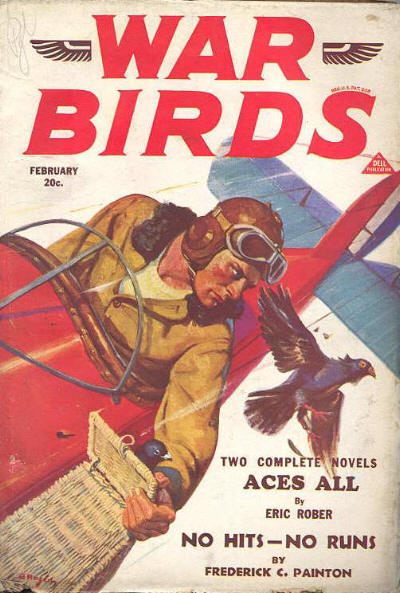“Hell’s Seven Keys” by Lester Dent
LESTER DENT is best  remembered as the man behind Doc Savage. But he wrote all number of other stories before he started chronicling the adventures of everyone’s favorite bronze giant. Here we have an action-packed tale of the air from the pages of the February 1932 issue of War Birds—”Hell’s Seven Keys!”
remembered as the man behind Doc Savage. But he wrote all number of other stories before he started chronicling the adventures of everyone’s favorite bronze giant. Here we have an action-packed tale of the air from the pages of the February 1932 issue of War Birds—”Hell’s Seven Keys!”
Captain “Bustem Bill” Harn is sent to the Sixtieth Pursuit Squadron to help take care of a certain Ace that’s been plaguing them lately—but that’s just a cover story. He was given secret orders…
To Bustem Bill Harn:
This is confidential. It accompanies orders you will receive to report to the Sixtieth, R.F.C., and fly a lone patrol in an effort to shoot down the German ace, Hauptmann Robart von Fleigg, whose circus is stationed in front of the Sixtieth. The orders have gone in duplicate to Major Geising, commanding the Sixtieth.
Here’s some dope for you. During the early part of the war, the Sixtieth was stationed in Egypt. While there, a detachment of native soldiers reported witnessing seven planes of the Sixtieth shoot down a German bomber. The crew of the enemy ship were slain, according to the witnesses, and the bomber was then burned, demolished and the parts buried in the desert sand. A patrol of seven Sixtieth ships in the air at the time denied having encountered the bomber. The native soldiers could not locate the spot where they said the bomber was shot down, when asked to do so.
Since then, five flyers of the Sixtieth have met mysterious and violent death, evidence in each case pointing to murder.
The only thing we have discovered which might point to a solution of the murders is that all of these five were among the group of seven who denied shooting down the Boche bomber.
The surviving two of the seven are lieutenant “Cockney Pete†Sauls and Captain “Devil†Leeds.
You are joining the Sixtieth ostensibly to bag von Fleigg. Make every effort to do this. But you will also bend every effort to solving these murders. Use care. Military intelligence sent an agent to investigate these killings and he was murdered.
This Sixtieth is a hard-boiled outfit and they have a cast-iron and brimstone skipper in the person of Major Geising. I can guess about how you two will get along. sending you there to get von Fleigg insulted him no little. He gave me a cussing over the telephone when I told him you were coming. unofficially, I hope you knock hell out of him. Officially, you had better bill and coo like a pair of doves.
Bustem, I’m sorry to hand you a lemon like this. But you’re the man for the job. Go in there and stamp on everybody’s toes and you may learn something. I can smooth out anything short of a killing. and if you succeed in shooting down von Fleigg, I can promise the ranking of major which you recently lost, will be restored. And should you solve these murders, I can also promiss you command of any pursuit squadron on the Front.
Luck to you!
General Sam H. Fitch,
Officer Commanding.
A key around a dead man’s neck was the thing that sent that Devil’s spawn of seven into action. It took red skies and Spandau steel to end that bloody trail.
- Download “Hell’s Seven Keys” (February 1932, War Birds)
If you enjoyed this story, Black Dog Books has put out an excellent volume collecting 11 of Lester Dent’s early air stories set against the backdrop of World War !. The book includes this story as well as others from the pages of War Birds, War Aces, Flying Aces, Sky Birds and The Lone Eagle. It’s The Skull Squadron! Check it out!
And as a bonus, here’s another newspaper article about Lester Dent! This time it’s a biography of the writer as a young man, well, 30. From The Daily Oklahoman, it’s “Lester Dent, The Wizard of the Pulps!”
Lester Dent, The Wizard of the Pulps
by Jack E. Ray • The Daily Oklahoman, Oklahoma City, OK • 19 July 1936

LESTER DENT is one of the most valid of cosmopolitans. He was born in Missouri. Was taken to and lived on a series of farms near Broken
Arrow (Oklahoma). Just In tjme to avoid having oil struck on his place. Dent’s father sold out and the family moved to a godforsaken cow ranch in the Wyoming sagebrush.
Then back to Missouri, in 1918 when Dent was 12 years old. Only 30 years old now. he has lived almost everywhere. Recently he returned from a treasure hunt in the Caribbean on his schooner, “The Albatross.” His home, he says, is wherever he happens to be sitting at his typewriter at the moment. Just at present, that is New York. However: “I guess I’m more Oklahoman than anything else, having lived there longer than anywhere else by about five years.”
Dent got to the fifth grade, moved to another place, and entered high-school. . There he flunked English for four consecutive years, after which a disgusted teacher asserted that he was hopeless along that line. Graduated from hlghschool in 1923, and took a course In telegraphy. Got a job at $45 a month, working nights for the Associated Press in Tulsa.
WHILE on that job, Dent started writing adventure stories. Sent one of them to George Delacorte of the Dell Publishing Co. Delacorte wired him to come to New York If he was making less than $100 a week. “But,” says Dent, “I thought he was nuts. I’m still not sure—” Anyway, after telegraphing friends in New York to inquire about the publisher’s sanity, he went to New York. He was given two magazines (”Scotland Yard” and “Sky Riders”) to fill. Dent cleaned up 4.000 bucks the first month, and as much monthly for three more magazines. Then both magazines went broke. That was in 1931—the depression had arrived. For the next six months he would sell a story to a magazine and before he could sell it another one, that magazine would fold up. Finally he found some that were on an even keel.
Dent’s work has been for the pulp magazines. He has sold to over 30 publications, of the cowboy, detective, adventure, air, and mystery types. Also to writers’ magazines. He uses a dozen pen names, including Kenneth Robeson. Maxwell Grant, H. O. Cash, Tim Ryan, and various others. Has long ago lost track of just how many yarns he has sold, although he knows the total is more than 1,000. For the last three years he has received not one rejection slip; in fact, the stories were contracted for in advance.
DENT is the second most prolific author in the world. For a year his output was an average of 200,000 words a month/all of which he sold. That, he says, Is not his limit. Here’s how he works: Out of bed at 11 a.m. works until about 4 p.m., reads the papers, takes a walk, naps for an hour; then works until 3 or 4 a.m. Does this five days a week. Biggest production for a day: On dictaphone, 32,000 words; on typewriter, 24,000 words. Most words turned out in a continuous session: 45,000 words (a book). This required a night, day, and part of night, from beginning of plotting. He never revises. His copy comes out of machine and goes in “as is.”
Under the nom de plume of Kenneth Robeson. Dent writes monthly a 60,000-word (book-length) “Doc Savage” story. The “Doc Savage Magazine” was the most successful pulp magazine in the world the second year of its existence. Dent claims his character. Doc Savage, is an unconscious composite of the physical qualities of Tarzan of the apes, the detective ability of Sherlock Holmes, the scientific sleuthing mastery of Craig Kennedy, and the morals of Jesus Christ. He has written perhaps 50 novels about his creation, at present being over a year ahead of the magazine which prints them.
THE following should encourage embryo writers. Dent swears it’s true: “Pulp magazines are more widely open than ever for new writers. Just send them a half-way printable story and they’ll buy it. . . . The pulps are an excellent training field. When I started writing for them, less than five years ago, T. S. Stribling was only a pulp hack.”
Dent regrets that he has written under so many pseudonyms, instead of building up one name—his own—in the pulps. This mistake was made partly because of the fact that editors don’t like to carry more than one story under the same name in a single issue of a magazine. So Dent would sign one with his real name, and others with noms de plume. Occasionally, he has written entire issues of magazines in this manner. Consequently, although his output ranks among the greatest, his name is not especially well known.
Asked if he entertained any unrealized literary ambitions. Dent replied, “One million of them, all made of silver, called dollars, and in banks, preferably several banks.” Everything considered, this is not a vain desire at all—for Mr. Dent.
- Download “Lester Dent: The Wizard of the Pulps”
(19 July 1936, The Daily Oklahoman)




